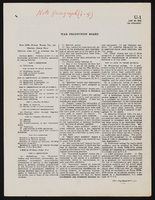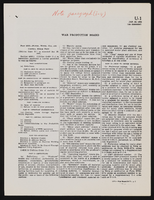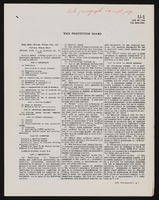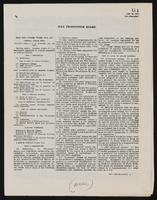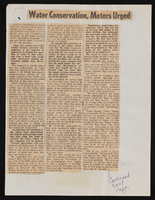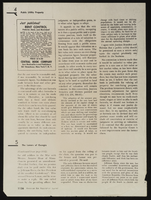Search the Special Collections and Archives Portal
Search Results

Transcript of interview with Charles Nur Fernald by Claytee D. White, May 31, 2014
Date
2014-05-31
Archival Collection
Description
Dancer Charles Nur Fernald first came to Las Vegas in 1963 to perform for five weeks in the Kay Starr Show at the Sahara Hotel and again in 1964 working with Donn Arden for three months at the Desert Inn Hotel. Born in Detroit, Michigan, in 1939, Charles moved several times to various places in Arizona and southern California with his parents, Charles Knox Fernald and Marguerite Marie Higgins Fernald, and half-siblings before settling in Hollywood, California, where he remained (except for his short stints in Las Vegas) from 1961 to 1967. In January 1968 Charles came to Las Vegas to perform with Sid Caesar and Imogene Coca at the Flamingo Hotel. After the show closed Charles auditioned for Donn Arden to dance in the Lido de Paris show at the Stardust Hotel, where he remained for sixteen years, 1968 through 1984. He remains the only male dancer who performed with Lido through five different, consecutive productions. In 1969 Charles met his partner, Aquiles Garcia, who was a dancer at the Dunes Hotel. The couple remain in Las Vegas and have been together forty-five years. Charles’s father was very poor and left school after the third grade to go to work and help support his family. He was born in 1889 in Philadelphia, Pennsylvania, the fifth of eleven children. As an eight-year-old he became a “groundhog,” a digger of New York’s underwater tunnels, who helped build the Holland Tunnel. At fifteen he made more money than his father selling newspapers, fresh fruit, and clothing door to door or from the street corner. According to Charles, his father “drank too much, ate too much, smoked too much, and loved too much.” As an only child, Charles’s mother had a very different upbringing from his father, although her family too was very poor. She was born in Detroit in 1902 to a railroad switchman father and mother who not only scrubbed the floors of wealthy Detroiters but also cooked meals for twenty-one boarders at a rooming house. Marguerite’s parents worked hard so they could send their only child to Catholic school and the Detroit Conservatory of Music.
Text

Transcript of interview with Donald L. Shalmy by Stefani Evans and Claytee D. White, March 10, 2017
Date
2017-03-10
Archival Collection
Description
Enjoying the lush desert landscaping of his back yard Pat Shalmy looks back in wonder at his longevity in Clark County. The man who always knew when it was time to move on somehow decided to stay put after he arrived in Southern Nevada in 1979 to "start something brand new" as Clark County’s first comprehensive planning director. In 1984, he became Clark County manager and served until 1997, when he left to become president & CEO of the Las Vegas Chamber of Commerce. In 2001 he joined the Board of Las Vegas Monorail Company and affiliated with the law firm of Kummer, Kaempfer, Bonner and Renshaw as director of government and community relations. He shortly "moved on" in May 2002 to become president of Nevada Power Company, where he remained until his 2008 retirement. He currently serves as Chairman of the Board of Las Vegas Monorail Company. While his extensive Nevada portfolio reflects his educational background—a bachelor’s degree in Urban Geography from the University of Arkansas and a master’s of science degree in Urban and Regional Planning from the University of Arizona—it nonetheless belies his upbringing as the son of a Syrian immigrant in Pine Bluff, Arkansas. His Southern accent seems to thicken as he spins stories of his parents, his brother, his friends, and the multiethnic but racially segregated town of his youth. In this interview, Shalmy discusses his youth and early career prior to arriving in Clark County. He explains how comprehensive planning benefits Clark County and why the Clark County Board of Commissioners is so powerful. He emphasizes the importance of government and private industry working cooperatively, especially in times of rapid urban growth. He compares his role as county manager during the building frenzy of the late eighties and early nineties with the responsibilities he shouldered as president of Nevada Power in the boom that preceded the recession of 2009: in both periods he oversaw delivery to a rapidly expanding customer base and had to ensure consistent service and efficient delivery at a stable price. And through it all, he credits Robert "Bob" Broadbent for his wisdom in visualizing a regional and comprehensive planning framework that could drive Clark County growth.
Text
Pagination
Refine my results
Content Type
Creator or Contributor
Subject
Archival Collection
Digital Project
Resource Type
Year
Material Type
Place
Language
Records Classification

